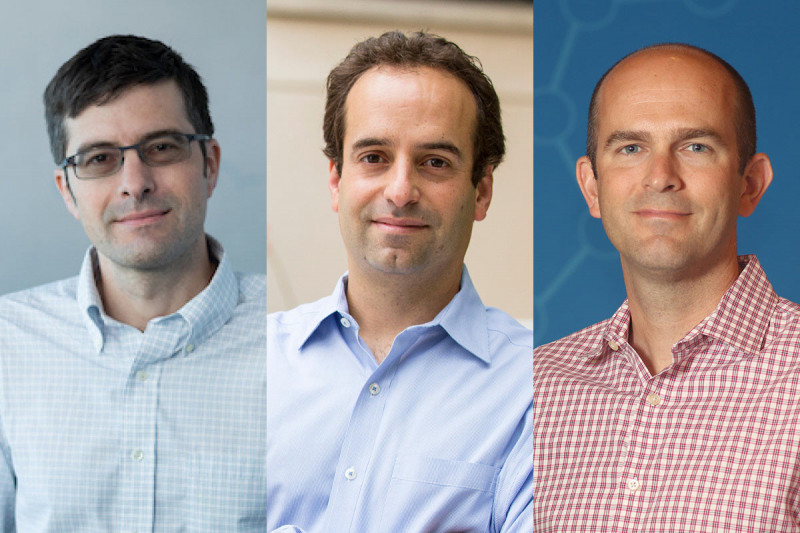
The winners for 2019 are Nathanael Gray, PhD, of the Dana-Farber Cancer Institute and Harvard Medical School; Joshua Mendell, MD, PhD, of the University of Texas Southwestern Medical Center; and Christopher Vakoc, MD, PhD, of Cold Spring Harbor Laboratory.
Nathanael Gray
Nathanael Gray, PhD, is the Nancy-Lurie Marks Professor of Biological Chemistry and Molecular Pharmacology at Harvard Medical School and the Dana-Farber Cancer Institute. He also leads the Dana-Farber Program in Chemical Biology.
Dr. Gray’s research centers on drug development and medicinal chemistry related to targeted therapies for cancer. Unlike most traditional targeted therapies, however, which block the activity of cancer-causing proteins, his lab is taking a different approach: His team instead aims to find ways to degrade these proteins.
“The analogy used with conventional targeted therapies is that the drug is a key and the protein is a door that can be unlocked,” he says. “But what happens when you have a door with no keyhole and no combination? The only way you can get rid of the door is to blow it up. That’s the degradation approach.”
Most medicinal chemists work at either a drug company or in a chemistry department, but Dr. Gray sees great value in working at a cancer center. “This is the most valuable environment I could be in,” he says. “I’m collaborating with basic cancer scientists as well as physicians. All of us are focused on the problem of cancer. My job is to figure out which problems are tractable and then figure out an approach for solving them.”
Four drugs that Dr. Gray has had a hand in developing have already been approved the US Food and Drug Administration or are currently in clinical trials. “We plan to continue working on targets that were once considered ‘undruggable’ by using this protein-degradation approach,” he says.
Dr. Gray earned a PhD degree from the University of California, Berkeley.
View Nathanael Gray’s webpage at the Dana-Farber Cancer Institute.
Joshua Mendell
Joshua Mendell, MD, PhD, is a professor and vice-chair of the Department of Molecular Biology at UT Southwestern Medical Center. He is also a Howard Hughes Medical Institute Investigator.
His lab studies noncoding RNAs, which lack the instructions for making proteins. Much of his research focuses on a class of very small noncoding RNAs called microRNAs. “MicroRNAs regulate messenger RNA molecules, which do encode proteins,” Dr. Mendell says. “Over the years, my lab has investigated how these small noncoding RNAs contribute to tumor formation and how they become dramatically reprogrammed in cancer cells.”
One particularly important contribution from his lab was the discovery that MYC, a gene that’s overactive in many human cancers, promotes cancer in part by reprogramming microRNAs to favor tumor growth.
Not all microRNAs in cancer cells have the same function. Some act as oncogenes, meaning that they drive the formation of tumors. Others are tumor suppressors. This means that when their levels go down, tumors are able to form.
“We’re interested in finding therapies that change the activity of these microRNAs,” he explains. “For those that act as oncogenes, it could be beneficial to inhibit their activity. On the other hand, for those that act as tumor suppressors, we are working to restore their activity or increase their levels in cancer cells.”
Research in Dr. Mendell’s lab has expanded to include the study of other types of noncoding RNAs. “Other classes of noncoding RNAs are much more mysterious, and their mechanisms are more diverse compared to microRNAs,” he says. “We want to understand why our genome is producing so many RNAs that do not encode proteins and what role they may have in diseases, including cancer.”
Dr. Mendell earned MD and PhD degrees from Johns Hopkins University.
View Joshua Mendell’s webpage at UT Southwestern Medical Center.
Christopher Vakoc
Christopher Vakoc, MD, PhD, is a professor at Cold Spring Harbor Laboratory.
His research is focused on gene regulation, specifically determining how certain genes drive cancer growth and looking for ways to disable those genes. “The objective of our research is to figure out how we can use drugs to turn off cancer-promoting genes as a way to eliminate tumors,” he says.
In his lab, Dr. Vakoc performs genetic screening with the gene-editing technique CRISPR to figure out which genes and proteins are most important for cancer. “We systematically subtract each one to learn which of them are vital for sustaining cell growth,” he says. “The idea is that if we find a protein that cancer cells are addicted to, we can look for a way to block it.”
Among his most important discoveries was identifying a protein called ZFP64 as an essential factor in the growth of certain types of leukemia. His findings helped to illustrate how this protein drives cancer growth and suggested new treatments.
His lab is currently studying cancer growth in several other kinds of cancer, including pancreatic cancer, lung cancer, and sarcoma. “A lot of our methods are universally applicable,” he says. “It’s been very illuminating for me to compare and contrast how solid tumors behave differently from blood cancers with respect to gene regulation. We’re using a variety of different approaches to develop methods for targeting these genes.”
Dr. Vakoc earned MD and PhD degrees from the University of Pennsylvania.
View Christopher Vakoc’s webpage at Cold Spring Harbor Laboratory.